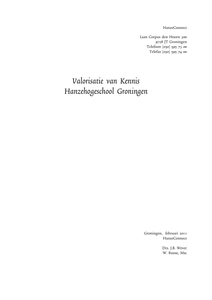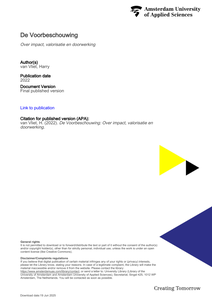De term ‘valorisatie’ gaat volgens Daan Andriessen en Anton Franken uit van het verkeerde concept. Juist in het hoger beroepsonderwijs zijn andere manieren nodig om het nut van praktijkgericht onderzoek te meten. ‘Wat ons betreft gaat het in het hbo vooral om het creëren van waarde voor de maatschappij en voor het eigen onderwijs.
LINK
Deze inventarisatie biedt de Hanzehogeschool Groningen op korte termijn een eerste overzicht van de bijdrage die zij levert aan de economische en maatschappelijke ontwikkelingen in de regio en internationaal.
DOCUMENT

Het Kenniscentrum NoorderRuimte heeft in een aantal kleine dorpen in de provincie Groningen en Drenthe leefbaarheidsonderzoeken uitgevoerd en op basis daarvan geadviseerd voor een nieuwe dorpsvisie of voor dorpsplannen. In het kader van de valorisatie van onderzoek aan Hanzehogeschool Groningen is onderzoek gedaan naar de maatschappelijke impact van deze dorpsonderzoeken en advisering.
DOCUMENT

Uit het rapport: "Hogescholen verrichten praktijkgericht onderzoek. Dit onderzoek is gericht op het verhogen van de kwaliteit van de hbo-afgestudeerden, op het responsief houden van het onderwijs én op het innoveren van de beroepspraktijk. Hogescholen worden dan ook al geruime tijd betrokken bij het nationaal en regionaal beleid dat zich richt op de maatschappelijke waardecreatie vanuit kennis ofwel valorisatie. Zo zijn zij sinds het ontstaan actief betrokken bij het Valorisatieprogramma (2010) en wordt in het Hoofdlijnenakkoord (2011) gesproken over het ontwikkelen van een eigen set valorisatieindicatoren voor hogescholen. De brief ‘Wetenschap met Impact’ van staatssecretaris Dekker van 19 januari 2017 richt zich echter voornamelijk op de universiteiten. Dit is mede aanleiding voor de Vereniging Hogescholen om een eigen visie te ontwikkelen op de maatschappelijke waardecreatie vanuit kennis in het hbo en hier uitwerking aan te geven. Daarvoor is een Ad hoc commissie opgericht bestaande uit bestuurders en lectoren. In dit rapport presenteren zij hun visie en de uitwerking daarvan."
DOCUMENT

Een vingertop raakt een wateroppervlakte aan, de ontstane rimpeling vormt cirkels in het water. Een bijna poëtisch beeld van een eerste beweging die iets in gang zet en alles beroert in haar omgeving en verder weg, in ruimte en tijd. Een beweging onmiskenbaar herleidbaar tot de aanraking van die vinger, hoe voorzichtig deze het water ook streelt. Een aanraking die zich verspreidt, gevolgen heeft, ertoe doet. Het is een beeld van kracht en onontkoombaarheid, iets is teweeg gebracht. Het is een beeld dat staat in de kunsthistorische traditie van de aanraking die verbindt, die doorgeeft, zelfs het leven. Een begin, een geboorte…
DOCUMENT

An extensive inventory of 137 Dutch SMEs regarding the most important considerations regarding the use of emerging digital technologies shows that the selection process is difficult. En trepreneurs wonder which AI application suits them best and what the added (innovative) value is and how they can implement it. This outcome is a clear signal from SMEs to researchers in knowledge institutions and to developers of AI services and applications: Help! Which AI should I choose? With a consortium of students, researchers, and SMEs, we are creating an approach that will help SMEs make the most suitable AI choice. The project develops a data-driven advisory tool that helps SMEs choose, develop, implement and use AI applications focusing on four highly ranked topics.
LINK
In deze publicatie proberen we de praktische relevantie van praktijkgericht onderzoek nader uit te werken. Wat is een goede term om de praktische relevantie van praktijkgericht onderzoek te duiden? Wij pleiten voor gebruik van het begrip doorwerking van onderzoek. Wat betekent dat voor de beoordeling van de kwaliteit van het praktijkgericht onderzoek in het HBO? En waar kijken we dan naar? Is doorwerking hetzelfde als valorisatie? Hoe kunnen we het meten? En hoe kunnen we het bevorderen. Op deze vragen willen wij in onze bijdrage aan antwoord geven. Allereerst beschrijven we de voor- en nadelen van de term valorisatie en introduceren we doorwerking als centraal begrip. Daarna beschrijven we het systeem waarmee de Hogeschool Utrecht probeert inzicht te krijgen in de doorwerking. Tot slot doen we een aantal suggesties hoe hogescholen de doorwerking van praktijkgericht onderzoek kunnen vergroten.
DOCUMENT
Website van Marklinq, de kenniskring van het lectoraat Marketing / Marktgericht Ondernemen, waarbinnen marketingonderzoek wordt uitgevoerd door docentonderzoekers. Het unieke van Marklinq is dat bedrijven er lid van kunnen worden en zelf hun onderzoeksvragen kunnen inbrengen. Op die wijze is de valorisatie van het onderzoek gegarandeerd. Marklinq is dus te beschouwen als de onderzoeksverbinding tussen de Hanzehogeschool Groningen en het bedrijfsleven.
LINK
Een praktijkgericht onderzoek in het hbo heeft als doel om nieuwe kennis te ontwikkelen die een bijdrage kan leveren aan de (beroeps)praktijk. Praktijkgerichte onderzoekers in het hbo zouden zich daarom moeten afvragen in welke mate hun onderzoek een duurzame bijdrage levert. Wij presenteren hiertoe een domein-overstijgend hulpmiddel: Het Praktijkgereedheid van Onderzoek-model (PRO-model). We definiëren daarin de praktijkgereedheid van onderzoek als de mate waarin onderzoeksactiviteiten bijdragen aan veranderingen in de praktijk die blijvend zijn, ook nadat het onderzoek is afgerond.
MULTIFILE
